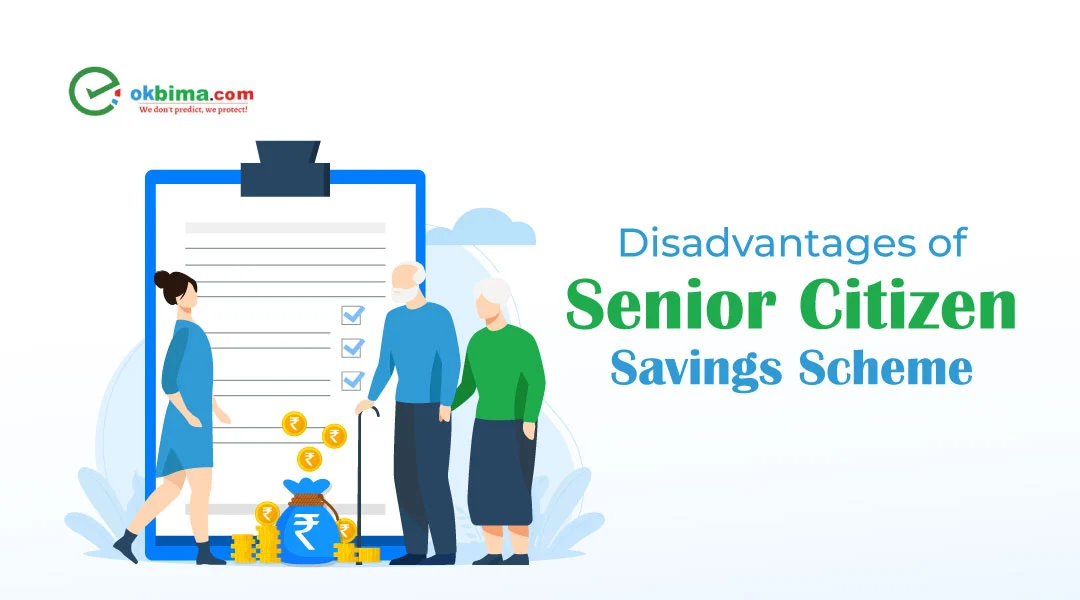

Disadvantages of Senior Citizen Savings Scheme: The Senior Citizen Savings Scheme (SCSS) in India offers many benefits to retirees, but there are also several disadvantages that should be considered. Let’s understand its disadvantages in detail.
The Senior Citizen Savings Scheme (SCSS) is a savings scheme in India launched by the government for individuals who are 60 years old and older.
Some features of the SCSS:
Eligibility: Individuals aged 60 years and above are eligible to open an account under the SCSS. Individuals aged 55 years or above but less than 60 years who have retired on superannuation or under a voluntary or special voluntary retirement plans can also open an account subject to certain conditions.
Investment limit: The minimum amount that can be deposited in an SCSS account is Rs. 1,000, while the maximum amount is Rs. 15 lakhs. The investment made in an SCSS account can be in multiples of Rs. 1,000.
Tenure: The SCSS has a tenure of 5 years, which can be extended for an additional 3 years after maturity.
Interest rate: The interest rate offered on SCSS is fixed by the government and is higher than the rates for other small saving schemes. The interest is paid out quarterly and is taxable.
Premature withdrawal: Premature withdrawal is allowed after the completion of one year from the date of account opening. If the withdrawal is made before 2 years, a penalty will be charged, and after 2 years, the penalty is reduced.
Tax benefits: Investments made in the SCSS are eligible for tax benefits under Section 80C of the Income Tax Act, subject to a limit of Rs. 1.5 lakhs per financial year.
Nomination: Account holders can nominate one or more individuals to receive the proceeds of the SCSS account in case of death.
Secure Your Loved Ones' Future: Compare Life Insurance Now!
Here we have mentioned top 10 disadvantages of senior citizen savings scheme such as limited scope of investment, low interest rates, lock-in period, etc.
Limited scope of investment: Senior Citizen Savings Scheme (SCSS) has a relatively low investment limit of Rs. 15 lakh, which may not be sufficient for seniors looking to maximize their savings.
Low interest rates: The interest rates offered on SCSS are not as competitive as other investment plans available in the market, which may result in lower returns for seniors.
Lock-in period: SCSS has a lock-in period of 5 years, which means that seniors cannot access their funds before the maturity date without penalties.
Penalty for early withdrawal: Seniors who wish to withdraw their funds before the maturity date will have to pay a penalty of 1.5% of the deposit amount.
Limited liquidity: SCSS does not offer the flexibility of liquidity, as seniors cannot easily withdraw their funds in case of emergencies.
Tax implications: Interest earned on SCSS is taxable as per the income tax laws, which may reduce the overall returns for seniors.
Inflation risk: The returns offered by SCSS may not be sufficient to beat inflation, which can be decrease in the purchasing power of seniors over time.
Limited flexibility: Seniors cannot make additional deposits into their SCSS account after the initial investment, which may limit their ability to maximize their savings.
No option for joint accounts: SCSS does not allow for joint accounts, which may limit the flexibility for seniors who wish to invest with a spouse or family member.
Limited access to banking services: Seniors who do not have easy access to banking services may find it difficult to open and manage an SCSS account, and can face challenges in investment management.
Peace of Mind for Yourself, Protection for Them: Get a Free Quote!
Read More:
Senior Citizen Saving Scheme (SCSS)
Best Monthly Income Scheme in India 2024
Atal Pension Yojana Scheme (APY)
National Pension Scheme (NPS Scheme)
In conclusion, the Senior Citizen Savings Scheme does have some disadvantages that need to be considered before investing. The low interest rates offered by the scheme may not be enough to keep up with inflation, leading to a decrease in the real value of the savings over time. Additionally, the lock-in period of 5 years may restrict access to funds in case of emergencies. You can contact “Our Experts” for the best recommendation.